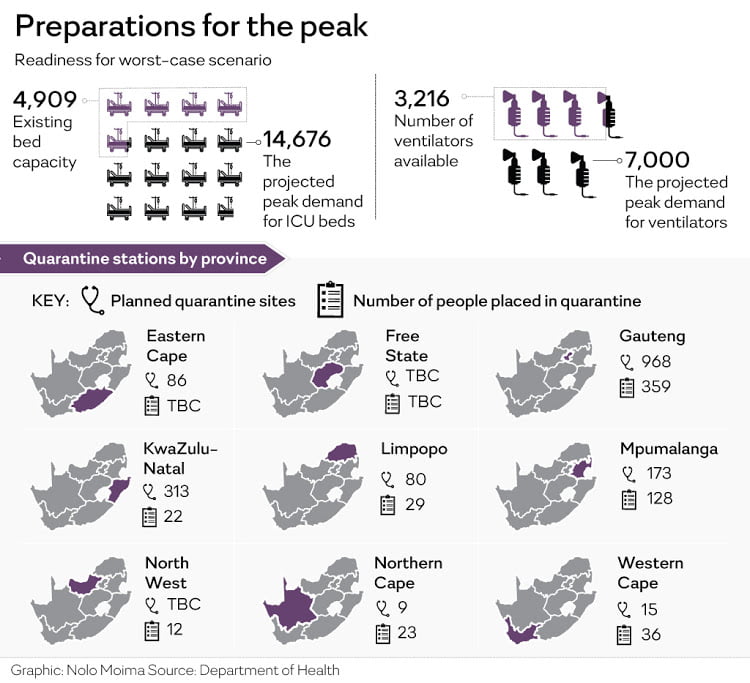
JOHANNESBURG SOUTH AFRICA 14 APRIL 2020 : HALL10 Johannesburg EXPO centre ( formarly NASREC) MEC for Health Bandile Masuku visits the site to inspect it for readyness to accomadate covid _19 patient overflow from hospitals in GAuteng . Craig Newman CEO of the expo Centre stated that 500 beds will be available immediately but the facility will be able to accomodate up to 4000 beds with the confines of the site in permanent and temorary structures that can be facilitated within 5 days.(Picture: ER Lombard/ Gallo Images|
As SA braces for an onslaught of Covid-19 infections, the state is moving to establish 1,644 emergency field hospitals and quarantine sites to shield a health-care system short of critical-care beds and ventilators.
A total of 2,000 beds for quarantine patients are being installed at the Nasrec centre in Johannesburg – which is being retrofitted to accommodate patients – and three acute facilities under construction in the Western Cape.
Gauteng and the Western Cape appear to be furthest along, but provincial health departments in KwaZulu-Natal and the Eastern Cape said plans were being drawn up, ushering in the next stage of the fight against the pandemic as lockdown restrictions are eased.
According to a report tabled by the health department before parliament’s health portfolio committee last week, plans are underway to have a national capacity of 7,356 field hospital beds by the time infections peak – which the ministerial advisory committee forecasts will be between July and September, at an anticipated 78,000 infections.
By Sunday, 3 158 people had tested positive and 54 had died in SA due to the virus.

Image: Nolo Moima
Some field hospitals will be built from the ground up, but others will involve adapting buildings to accommodate the sick.
Public health and infectious disease experts hope field hospitals will help cover the chink in the health-care system’s armour – a dire shortage of critical-care beds and ventilators.
The public and private health-care sectors currently have a combined capacity of 3,318 critical-care beds and 3,216 ventilators.
The report says the upper bound peak demand for critical-care beds is forecast at 14,767, and the lowest at 4,100.
Primary health-care specialist Prof Mosa Moshabela said field hospitals are pivotal in keeping patients away from hospitals and maintaining the ICU network’s frail capacity.
“The advantage of field hospitals is that not only do they aid in overflow, but also with infection control,” he said.
IN NUMBERS
• 7,356 – Planned number of beds in field hospitals to be built or adapted around the country
• 1,644 – The number of facilities expected to be readied
• 3,318 – Total number of critical-care beds in the country
On Tuesday, Gauteng health MEC Dr Bandile Masuku unveiled the first phase of the Nasrec facility with 500 beds.
Gauteng premier David Makhura said the province was also putting up new permanent wards in Kopanong, Jubilee, Chris Hani Baragwanath and Dr George Mukhari hospitals to add 800 beds to the system. Some hospitals have been dedicated to treating Covid-19 patients.
In the Eastern Cape, premier Oscar Mabuyane said marquees will be erected for field hospitals.
Western Cape government spokesperson Mark van der Heever said two acute treatment facilities will be constructed in the Cape Town metro and one in a rural area.
The report before parliament said field hospitals will triage Covid-19 patients, sending the critical to ICU while isolating and treating the mildly or moderately affected.
Public health-care specialist Dr Kerrin Begg said: “We don’t want to get to the worst-case scenario. While we buy some time before the curve peaks, a lot of things are happening behind the scenes to get these field hospitals up.”
She and Moshabela emphasised the importance of slowing the spread of the virus, thereby reducing the number of ICU patients at one time.
Dr Lydia Cairncross, chair of the advocacy group People’s Health Movement, and a doctor in the public sector, said the process will be fraught.
“We will need spaces for isolation but the issue of what happens to people who test positive is really critical to the way the stigma of this pandemic is managed,” she said.
People need to be tested willingly, she said, and not be concerned about where they will go if they test positive.
“We don’t want to create a stigma where you test positive, you’re parachuted out of the community to some faraway place and kept in isolation.
“Community care centres rather than quarantine facilities is what we are talking about,” she said.
Other provinces, and the national health department, did not respond to questions.
Read the latest updates on the COVID-19 Pandemic in South Africa here.





